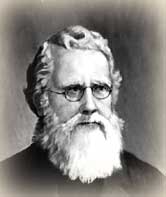Arranged from the book, “Hudson Taylor And The China Inland Mission. The Growth Of A Work Of God”
by Dr. and Mrs. Howard Taylor.
Missionary J. Hudson Taylor would sometimes say: “There are commonly three stages in work for God:
first, impossible; then difficult; then done. How many estimate difficulties in the light of their own resources,
and thus attempt little and often fail in the little they attempt! All God’s giants have been weak men who did
great things for God because they reckoned on His being with them….”
After ten years of work in inland China, Mr. Taylor could point to 28 mission stations in five provinces with
six hundred converts having been baptized. Of these converts, more than seventy were preaching the
Gospel. Sixty-eight missionaries had gone to serve with China Inland Mission.
In 1876 when Mr. Taylor was ready to return to China from his homeland of England, relations between
China and England were strained. War seemed imminent. Mr. Taylor was advised against returning. War
could close the door to all missionary activity. Fervent prayer was made. At the last moment, a change came
and doors to the western provinces opened. Missionaries had liberty to travel in any part of China.
The China Inland missionaries took advantage of this liberty to travel about 30,000 miles in the next
eighteen months. Scriptures were sold or distributed everywhere, and the Gospel was preached all along the
way. Travel was by foot and wheelbarrow over rough roads. Accommodations were poor. Food was simple
and sometimes coarse. But for Jesus’ sake, it was all borne willingly, and later journeys proved that converts
made had been real.
Busy though Mr. Taylor was with his traveling and preaching and doctoring and correspondence, a fellow
missionary recalls that it was his daily practice to remember the seventy or so missionaries three times a day,
at least once mentioning them by name. He, too, remembered the national workers.
The next time the Taylors were in England word came of famine in the western provinces. There was
urgent need of a woman leader who could accompany the pioneering women into the West to help care for
the famine orphan children. The Taylors agreed that while he remained to care for matters in England, she
would return to China to assume the leadership. Mrs. Taylor was one with her husband in the belief that they
must never let the pressures of the work rob them of their communion with the Lord. She saw the most
important part of their work as intercession, battling through in prayer for their fellow workers. “They fight the
seen, and we must fight the unseen battle,” she said.
Soon Mr. Taylor had also returned to China and had thrown himself into the work again. He became quite
seriously ill and together the Taylors journeyed to a northern province where the climate was more
agreeable, in order that his life might be spared. While recuperating here, Mr. Taylor came to the conclusion
that this would be a very satisfactory location for a sanitarium and a school for children of the missionaries.
Unexpectedly they were offered good land at a reasonable price. With wood secured from two wrecked
ships on the nearby beach, and with bricks which they made themselves, Mr. Taylor and a fellow missionary
also there to recover his health built a house. They were joined by two newly arrived young men missionaries
who found it a good language school and an opportunity to “live Christ” before the Chinese. The building put
up by those inexperienced builders served as a school for missionary children for many years. Eventually a
hospital, homes, other schools and a sanitarium were built there.
A New Step of Faith
As soon as Mr. Taylor was able, he left the building operation to others and set out for the western frontier
to give himself to a new responsibility. It had become apparent that the Chinese women of the western
provinces could be reached only by women missionaries. But it would require a giant step of faith to send
young, unmarried women “into all the dangers and privations, the hardship and loneliness of life in the far
interior of China. Let them take those perilous journeys of weeks and months at a time, and condemn them
to isolation in crowded cities, hundreds of miles from any other foreigner?”
Still if there were those willing to go, and if the Lord was sending them, Mr. Taylor, after much thought and
prayer, was willing to accept the responsibility even for that. As he journeyed into this area, his
accommodations were so poor that at times he had to share them with the mules, which occasionally
disturbed his sleep by eating the straw from his pillow.
Through Mr. Taylor’s prayers and efforts, there eventually grew up a string of thirty ladies’ mission stations
with churches and schools and hundreds and hundreds of baptized believers. Thus was proved how God
uses the weak things to confound the mighty. Missionary wives showed themselves to be true heroines of the
faith also. One was the only foreign lady in all the province of twenty-one million people, the first Christian
woman who had lived and worked among the Chinese women of the area. How gladly she was welcomed!
She had access to rich and poor women alike. Sometimes she so extended herself to help them that she
fainted away from weariness.
Back in the homeland, prayer meetings had been organized especially for the women’s work. No doubt the
success and safety of this part of the missionary endeavor was in no small part due to the prayer focused
upon it. But it must be told, too, that along the trail of the pioneer stations were found lonely graves – little
graves of children, larger graves of mothers, or single ladies. “Others will come after us…,” said one
missionary mother as she neared the end of her hard and seemingly fruitless toil. She was right. Years later
there were thousands of baptized believers in the area.
(To be continued)













